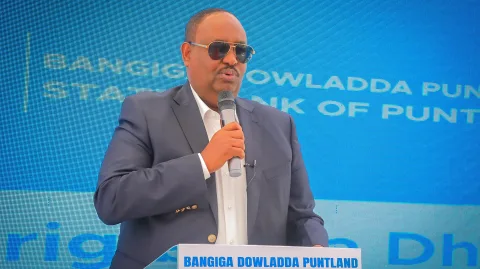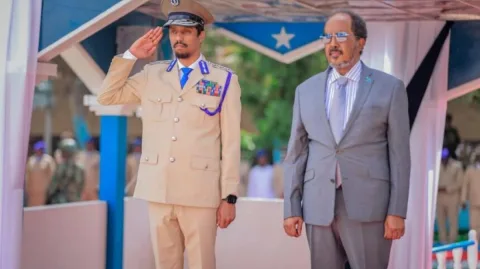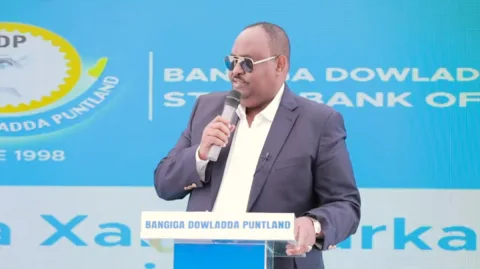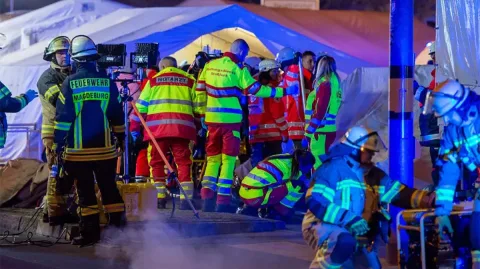Since my appointment as Prime Minister in June the humanitarian, security and political landscape in Somalia has changed significantly
 Mr. Secretary-General,
Mr. Secretary-General,
President of Kenya, President of Brundi, Vice President of Uganda, Deputy Prime Minister and Minister of Foreign Affairs of Ethiopia, Secretary of State of US, Foreign Secretary of State of UK, Minister of Foreign Affairs of Turkey, Minister of Foreign Affairs of Djibouti, Under Secretary General Lynn Pascoe, distinguished participants, Ladies and Gentlemen,
Let me begin by thanking the Secretary-General and his team for organizing this important session. We, Somalis, appreciate your tireless efforts in putting Somalia on the top of the agenda, despite having too many competing priorities. We hope that Somalia will become peaceful and stable during your tenure.
Indeed, I must acknowledge and thank the Secretary-General and his Representative for Somalia, Dr. Augustine Mahiga, for their continued engagement and tireless efforts in the cause of peace and reconciliation in Somalia.
Ladies and Gentlemen,
Since my appointment as Prime Minister in June the humanitarian, security and political landscape in Somalia has changed significantly. The dire humanitarian crisis in the country continues to be our foremost challenge. As you well know, the famine is spreading and currently threatens half of the population, or over 4 million people. The situation is expected to worsen in the coming months. At this juncture, allow me to express my gratitude, on behalf of the entire Somali nation for the vital assistance we are receiving from the international community and humanitarian agencies. The Transitional Federal Government remains committed to working with all of you to ensure that the aid is delivered to all those who need it in a safe and timely manner.
In this time of national crisis, we the Somali people must set aside our differences and come together to confront the perils.
Reconciliation must become our mantra as we work to further the peace process and create an environment conducive for the delivery of aid. We in the political class must also accept our responsibility for the errors of the past and resolve to do better. The Somali people have had enough of war and hunger; enough of political wrangling and corruption. They demand, and indeed deserve, a government that puts the national interest before personal ambition; one that fosters unity, not division.
Somalia has shown that it can do better. Even as we acknowledge our liability for past failures, we can draw inspiration from what has gone right. The peace process, for example, is one such. The conference in Mogadishu was the culmination of Somali-led reconciliation initiatives. It is therefore clear that while the process has not always been smooth, it has nonetheless proven to be inclusive, locally driven and something that all Somalis can rightly take pride in.
With the help of the international community, we have now taken the first steps towards concluding this process. Three weeks ago, politicians from across the diverse Somali spectrum, including the central government and regional administrations, came together in the capital, Mogadishu, to chart a new course for the country. Following a three day Conference, we adopted a
Roadmap to pave the way for the restoration of permanent, representative and accountable government, and publicly committed ourselves to working together to implement key priority tasks, including the adoption of new constitution by August next year.
In the run up to the Conference, President Sheikh Sharif and I had paid visits to the Puntland and Galmudug regions and these have created a strong foundation for good working relations between the Federal Government and Regional Administrations. I also signed an agreement with the President of Puntland, which will help us further develop the relationship.
As we prepare Somalia for the end of the transition, we have established a 16 member technical committee to oversee its implementation comprising of representatives of all political entities in Somalia as well as regional organizations and our key international partners. This committee will be responsible for developing a detailed implementation plan and providing technical guidance and political facilitation while ensuring that the agreed benchmarks and timelines are achieved.
We have also set up a 9 member Committee of Experts to review the draft constitution developed by the Interim Federal Constitutional Committee and make recommendations on the way forward. We are also liaising with the Parliamentary leadership to ensure that the Transitional Federal Charter is amended to give a legal framework for the constitutional process.
Clearly, the battle against Al Qaeda is one in which we all have a stake and in which we all, therefore, have responsibilities. In Somalia, we have been doing what we can, within our limited resources, to fulfill our obligations in this regard. Barely a month after US forces killed Osama bin Laden, one of his most wanted deputies, Fazul Abdullah Mohammed, was shot dead by Somali security forces on the outskirts of Mogadishu. Shortly thereafter, with the aid of African Union forces, the Somali National
Army succeeded in forcing the extremists to withdraw the bulk of their forces from the capital. As a result, we are now able to begin to provide needed humanitarian assistance to the city’s ever increasing population of internally displaced persons who are fleeing the areas still held by the extremists where the famine has hit hardest.
Though the extremists’ retreat from Mogadishu is a welcome development, it may herald a new and more dangerous phase of the conflict as they increasingly turn to asymmetric tactics such as suicide bombings and the use of improvised explosive devices targeting the civilian populace. As we continue build up our capacities, our security agencies are alive to this threat and have already successfully disrupted a number of planned attacks, including several targeting the hungry at feeding centres.
We have implemented Mogadishu Stabilization Plan in order to ensure that areas vacated by Al-Shabaab are secure and free from explosives, so that people can return to their homes safely. We have established local administrations and local security committees and in the process we have engaged with the community. Our plan is to first secure areas, establish administrations and to provide humanitarian assistance. We have also established two task forces to uphold the rule of law and to safeguard the delivery of humanitarian aid.
In all this, I must once again acknowledge and thank the international community for its continued engagement and patience without which the process would have been doubly difficult. Going forward, we will continue to call upon all of you to provide us with the necessary resources to achieve our goals, commensurate with the progress being made.
Let me once again reiterate my personal commitment, and that of my government, to ensuring that the faith both you and the Somali people have placed in us is not betrayed. I am certain that with your continued help, Somalia will overcome the difficulties of the present and move towards a secure and prosperous future.
Thank You.





